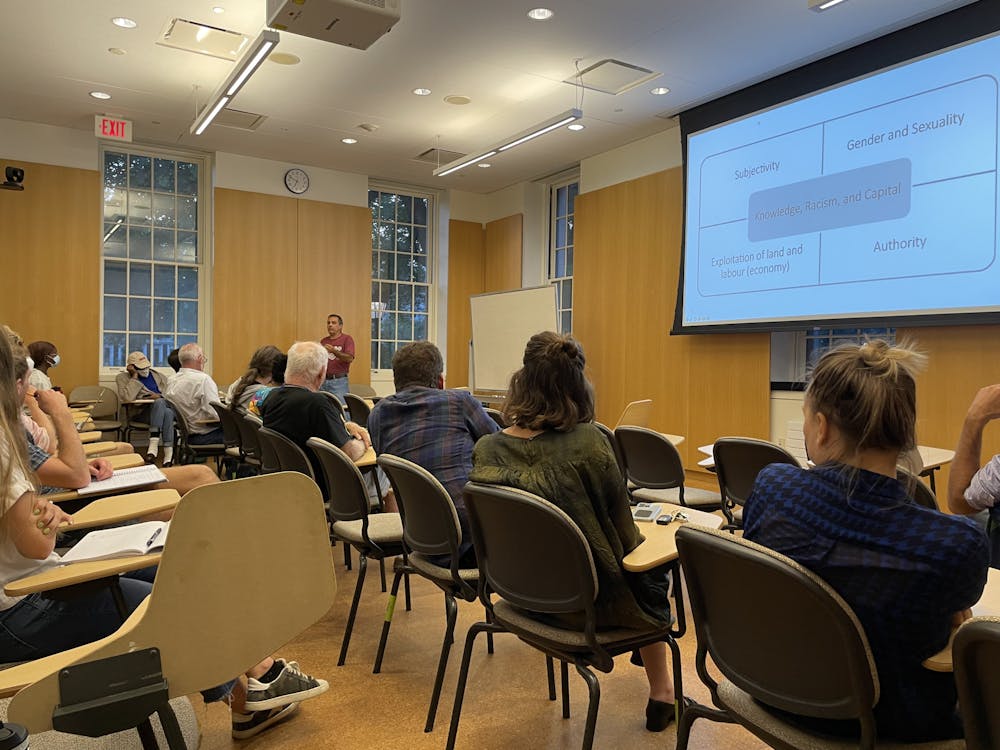Colonization and its effects are deeply entrenched in the field of archeology, said scholars at an event held Wednesday evening at the Joukowsky Institute for Archaeology and the Ancient World.
To reckon with this history, the Institute has invited Cristobal Gnecco, a professor of anthropology at the Universidad del Cauca in Colombia, to campus as a visiting scholar. Gnecco and other scholars in the Institute discussed the aspects of archeology rooted in colonialism as part of a larger conversation on improving the practice of the field Wednesday.
Guided by a national conversation about expanding the definition of archeology as a practice, the Institute’s faculty members have begun to consider “archeology as politics,” said Felipe Rojas, associate professor of archaeology and the ancient world and an organizer of the event, which drove them to seek perspectives such as Gnecco’s that have differed from mainstream U.S. viewpoints.
“Archeology is so deeply embedded in the constitution of inequality that we have to do something else,” Rojas said. Rojas and other faculty members said at the event that being in conversation with someone native to South America is one way to bring in another perspective to this debate — for students and faculty alike to engage with.
Gnecco, who will be participating in multiple other seminars during his two-week stint at the University, discussed the aspects of archeology that disrupt natural environments and local communities.
Archeology requires engaging different types of knowledge and should encourage a more equitable relationship between the “researchers” and the “researched,” he said, adding that the discipline traditionally creates a “temporal distance from those who are different.”
Matt Ballance, a PhD student in the Department of Anthropology, commented on this ongoing discussion: “Not only has (archeology) been practiced as an agent of colonialism, but it’s so inherently baked into the system that you can't expunge it and move forward.”
But Gnecco noted that archeology can decolonize the practice when it allows for collaboration with Indigenous groups and communities, who tend to experience the lasting effects of colonialism.
Within the field, there is an inclination to “flirt with diversity,” he added.
Gnecco said he believes that archeologists can go beyond the academic sphere and use “dialogue to push forward critical transformation.” Though this may seem “titanic,” he said, these changes are “of a disconcerted simplicity.”
“It requires abandoning the privileges that made archeology … and embracing cultural differences,” he said.
Rachel Kalisher GS, who is set to graduate in the spring with the Joukowsky Institute, said she recognizes that each person brings their personal connection and viewpoints into their perspective on archeology and how it can progress in the future.
“These are important conversations that need to be had (especially) among a broader community … with diverse and dynamic sets of ideas with tangible outcomes,” Kalisher said. “That’s how you ultimately get change.”
Alyssa Bolster GS, who is pursuing a PhD in anthropology at the University, recognized that “as actual archeologists who are young, who are going into our dissertations … there has to be a practical lesson at the end of (these conversations that) we can take away from this and apply to our work to make sure we’re committing the best practices.”
Bolster and Ballance focus on the Andes region, where there’s a longstanding history of archeology that “advances the colonial project,” along with scholars who have more recently practiced community-led archeology which centers Indigenous communities, Bolster said. These practices ensure local communities create questions that the research is centered around; they also channel funds back into the local community, she added.
Miriam Rothenberg, visiting assistant professor of archaeology and the ancient world, discussed the practice of “archeology of the heart,” which features emancipatory and restorative-justice- oriented archeology that helps encourage deeper connections between archeologists and the communities they collaborate with.
Ballance said he is among those who “remain hopeful about the possibility of archeology being transformed rather than needing to be relegated to the dustbin of colonial institutions.”
“The archeology that we do as new-career archeologists does not have to be the archeology that was done” historically, Bolster said. “We have the opportunity to change the dialogue, change the narrative, change the types of questions we’re asking.”





